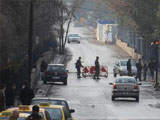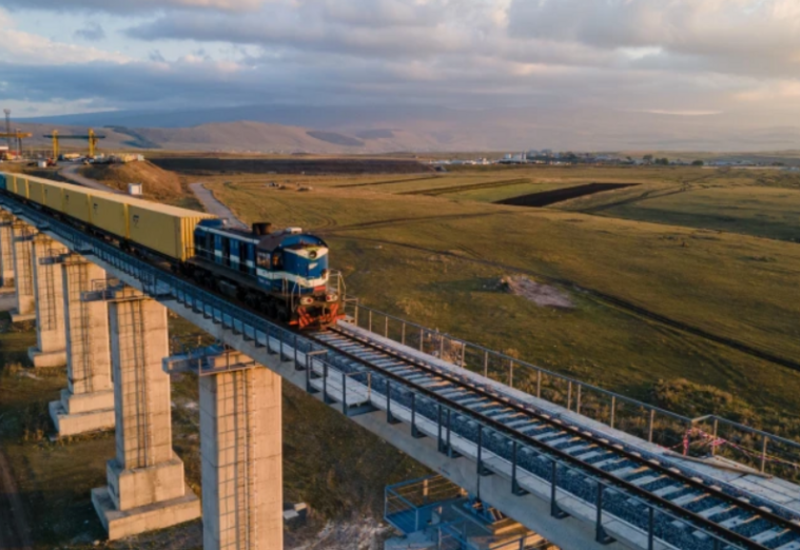|
|
TODAY.AZ / World news
Gov't-military tension mounts in Turkey ahead of key summit
28 December 2009 [13:45] - TODAY.AZ
 Tension resulting from disputes among Turkey’s top institutions – the military, the government and police and intelligence organizations – intensifies over the weekend with an investigation into an alleged assassination plot against the country’s deputy prime minister. The rising discord comes just before a key National Security Council meeting.
Tension resulting from disputes among Turkey’s top institutions – the military, the government and police and intelligence organizations – intensifies over the weekend with an investigation into an alleged assassination plot against the country’s deputy prime minister. The rising discord comes just before a key National Security Council meeting.Despite the long-standing picture of political instability in Turkey, the lack of trust among the country’s top institutions has deepened drastically, effectively ruining the ties between the military, government, police and intelligence organizations. These ruined ties also diminish the chance for cooperation among these entities for the security and well-being of the nation.
Under these conditions, the country’s top security board, the National Security Council, or MGK, will convene under the leadership of President Abdullah Gül with the participation of the top officials of the mentioned institutions.
Convening for the last meeting of the 2009, the bi-monthly MGK will bring Prime Minister Recep Tayyip Erdoğan; Chief of General Staff Gen. İlker Başbuğ; head of the National Intelligence Organization, or MGK, Emre Taner; Interior Minister Beşir Atalay; and other military and civilian officials together to likely discuss ongoing fault lines between these institutions.
A day before the crucial meeting, Erdoğan on Sunday tried to reduce the tension in a speech he held in Istanbul. He said that all institutions were working in harmony for the country’s stability.
“It’s depicted as if there is a problem among institutions, but there is no such thing,” Erdoğan said. “Everything goes on within the framework of the law. If there are people committing crimes within these institutions, it should not be attributed to the entirety of that institution. No one has the right to deteriorate the comfort of the country through rumors and gossip.”
But it was Erdoğan himself who held a three-hour meeting Saturday with Başbuğ and Land Forces Commander Gen. Işık Koşaner, the strongest candidate to replace Başbuğ next August, marking the second meeting with top commanders in a 48-hour span. Saturday’s meeting came hours after eight officers were arrested as part of a police investigation into an alleged assassination plot against Deputy Prime Minister Bülent Arınç, a move that deepened the row between the government and the military.
Intensified by the two consecutive police search at the Mobilization Command that serves under the Special Warfare Command, the tension in civil-military ties could be seen as part of the ongoing Ergenekon investigation. Civilian prosecutors claimed that a number of top commanders, prominent journalists, academics and other important personalities came together to topple the government in 2003 and 2004.
Another important reason for the growing tension was the military’s opposition to the election of Abdullah Gül to the presidency in 2007. Former Chief of General Staff Gen. Yaşar Büyükanıt had issued a statement, recalled as “e-memo,” opposing the idea of electing Gül, whose wife wore Islamic headscarves, to the presidency.
Reviving the fear of another military intervention in politics, the problem could only be overcome following a two-hour meeting dubbed the “Dolmabahçe talks” between Büyükanıt and Erdoğan. The content of the meeting was never disclosed.
For many in Ankara, Başbuğ’s decision to include Koşaner in his crucial meeting with Erdoğan was in order to avoid giving the impression of another Dolmabahçe meeting with the government.
As the Ergenekon investigation began to focus on alleged military documents outlining ways to weaken the government and even to topple it, more officers were taken into custody. In June, Commander Dursun Çiçek was arrested on charges of being a perpetrator of this anti-government plan that followed another called the “Cage Operation.”
Despite Başbuğ’s statements urging the government and the media to respect the principle of presuming innocence, the media continued coverage on allegations, which triggered more reactions from the military. Alongside institutional statements, the suicide of eight officers in the last two years shows how the situation has been disturbing the military and its members.
In this respect, the suicide of Commander Ali Tatar was the last example, which pushed Gen. Başbuğ to hold a press conference on board a military vessel discouraging the provocation of the institutions. For many in Ankara, Başbuğ’s messages targeted not only the civilians, but also its own officers, who felt disturbed by the treatment the Turkish Armed Forces, or TSK, received until now.
In the meantime, a legal amendment allowing civilian prosecutors to take legal action against the military personnel caused another rift between the military and the government, due to the vagueness of the law. According to some legal experts, the current version of the amendment does not give immunity to the top commanders. Despite Gül’s advice to the government to change it to avoid abuses of the law, the step has not yet been taken by the ruling party.
/Huriyyet Daily News/
URL: http://www.today.az/news/regions/58675.html
 Print version
Print version
Views: 3251
Connect with us. Get latest news and updates.
See Also
- 04 February 2026 [12:21]
First military friction emerges after US troop deployment near Iran - 04 February 2026 [09:00]
Spain to ban social media for under-16s - 04 February 2026 [08:00]
Singapore hosts top aviation show - 03 February 2026 [23:30]
Hubble sees NGC 7722 lenticular galaxy - 03 February 2026 [22:49]
Total Energies and Kuwait Oil Company sign mou to boost cooperation at KOGS 2026 - 03 February 2026 [21:50]
Israeli military sources say talks with Tehran do not ease readiness, expect possible US strike on Iran - 03 February 2026 [21:23]
iPhone 20 feature glass case - 03 February 2026 [20:54]
OpenAI seeks alternatives to Nvidia chips for AI - 03 February 2026 [18:46]
Trump set to welcome Colombian president to White House for talks - 03 February 2026 [15:16]
Norwegian parliament to debate abolishing monarchy over 'Epstein' crisis
Most Popular
 US moving forces into Middle East - What comes next with Iran?
US moving forces into Middle East - What comes next with Iran?
 Zangezur corridor become part of TEN-T: European Union is joining fight for South Caucasus
Zangezur corridor become part of TEN-T: European Union is joining fight for South Caucasus
 Pakistan says 48 killed in coordinated attacks in Balochistan
Pakistan says 48 killed in coordinated attacks in Balochistan
 The army is being taken away from Etchmiadzin
The army is being taken away from Etchmiadzin
 Slovakia PM adviser quits after Epstein messages surface in newly released US files
Slovakia PM adviser quits after Epstein messages surface in newly released US files
 Grain, fuel and politics of peace: How trade redrawing Armenia–Azerbaijan relations
Grain, fuel and politics of peace: How trade redrawing Armenia–Azerbaijan relations
 SOCAR, Huawei discuss digital transformation and advanced technologies in oil, gas sector
SOCAR, Huawei discuss digital transformation and advanced technologies in oil, gas sector
